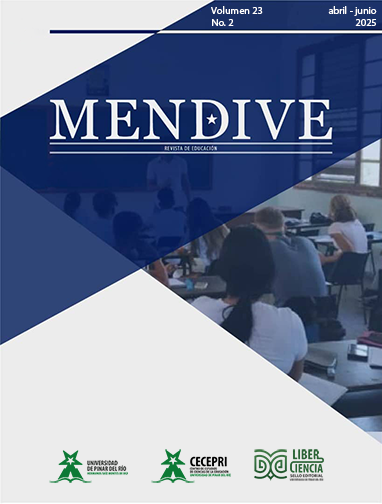Primary education for youth and adults in rural areas in the province of Salta, Argentina
Main Article Content
Abstract
Youth and adult education in Argentina was marked by debates that intensified from the 1950s to the late 1970s. It was in the 1980s that programs seeking to improve education in rural areas began to be implemented. However, the lack of specific didactic training for teachers and the perception of education as a compensation for students' educational deficiencies hindered progress. This research paper aims to analyze the process of return to democracy in Argentina during the 1980s, focusing on teacher training policies linked to youth and adult education in the province of Salta, particularly in rural contexts. To this end, a qualitative approach is adopted that includes the analysis of primary and secondary sources, as well as the triangulation of data from documents from the Ministry of Education and other relevant institutions. The results obtained indicate that, despite the implementation of programs such as the Rural Education Expansion and Improvement Program and the Agricultural Technical Education Expansion and Improvement Program, teacher training in rural settings has faced significant challenges. These limitations have limited the effectiveness of educational policies, which have failed to adequately meet the needs of the adult population, especially women. In conclusion, the study underscores the importance of developing inclusive educational policies that consider the specificities of rural settings and the diversity of adult learners.
Downloads
Article Details

This work is licensed under a Creative Commons Attribution-NonCommercial 4.0 International License.
References
Brusilovsky, S., & Cabrera, M. E. (2005). Cultura Escolar en Educación Media para Adultos. Una Tipología de sus Orientaciones. Convergencia. (Mayo-agosto), 277-311. https://www.scielo.org.mx/scielo.php?script=sci_arttext&pid=S1405-14352005000200277
Chaile, M. O. (2007) Retos y tensiones de la Formación Docente en el actual proceso de transformaciones. Educação e Pesquisa, 33(2), 215-231. https://www.redalyc.org/pdf/298/29833203.pdf
Chaile, M. O. (2004). Configuración de la formación docente del nivel básico y medio en la provincia de Salta, en relación con la función de estado (1950-1995). Universidad Rovira y Virgili. https://www.tdx.cat/handle/10803/8923
Cragnolino, E., & Lorenzatti, M. C. (2002). formación docente y escuela rural. Dimensiones para abordar analíticamente esta problemática. Revista Páginas, 2(2). https://revistas.unc.edu.ar/index.php/pgn/article/view/14988
Forni, P., & Grande, P. (2020). Triangulación y métodos mixtos en las ciencias sociales contemporáneas. Revista mexicana de sociología, 82(1), 159-189. https://doi.org/10.22201/iis.01882503p.2020.1.58064
Lorenzatti, M. C, Brumat, M. R., & Beinott, G. (2014). Políticas de formación docente inicial para educación rural en Argentina. Revista Iberoamericana de Evaluación Educativa, 7(3), 45-55. https://revistas.uam.es/riee/article/view/3101
Marradi, A., Archenti, N., & Piovani, J. I. (2018). Manual de metodología de las ciencias sociales. Siglo Veintiuno.
Maselli, A., Molina, M., & Pimenides, A. (2016). Los docentes de nivel secundario de jóvenes y adultos frente a la inclusión educativa. Praxis Educativa, 19(3), 53-61. https://cerac.unlpam.edu.ar/index.php/praxis/article/view/1078
Romero, N. H. (2020). Juventud (es), ruralidad (es) y educación secundaria. Universidad Nacional de Salta.
Wanschelbaum, C. (2013). Historia de la educación de jóvenes y adultos: El Plan Nacional de Alfabetización Argentina, 1985-1989. Revista Interamericana de Educación de Adultos, 35(2), 45-60. https://www.redalyc.org/articulo.oa?id=457545089003


